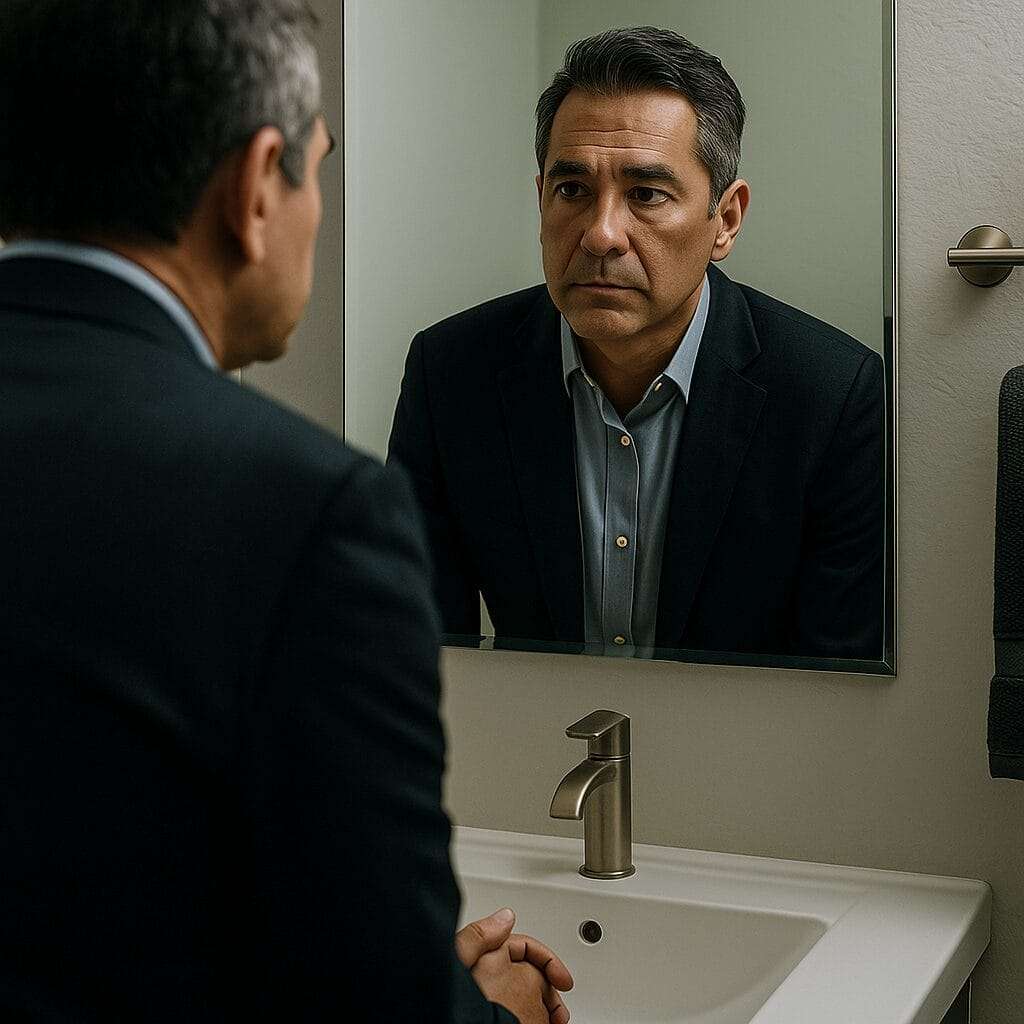- Updated: October 22, 2025
You’re hitting your goals.
Revenue’s strong.
Your team sees you as competent—even resilient.
But if you’re honest, something’s off.
You’re tired, not just physically—but emotionally spent in a way that sleep can’t fix.
You’ve got that low hum of paranoia under your skin… like at any moment, it could all fall apart.
And the scariest part?
You wouldn’t even see it coming.
Maybe you have missed it already.
One of my clients once shared how her trusted office manager embezzled nearly $50,000 from their trust account—right under her nose.
She didn’t miss it because she was stupid.
She missed it because she was armored.
She was performing, proving, holding the entire system together—and it never occurred to her that she was being emotionally manipulated by someone she trusted.
Because high performers don’t think of themselves as victims.
But here’s the quiet truth:
When you’ve built success on top of unhealed emotional trauma, you don’t just miss red flags—you normalize them.
You rationalize the unease.
You outwork the betrayal.
You call it pressure, not abuse.
But the rabbit hole goes deeper than you think.
Start Here: A Leader’s Healing Map
🧠 You Didn’t Imagine It—You Adapted to It
When you’ve been operating at a high level for years—running teams, building companies, managing crises—it’s easy to overlook what’s actually been hurting you.
You’ve trained yourself to stay calm under pressure.
You’ve gotten used to overfunctioning.
And whether you realize it or not, you may have also gotten used to being manipulated.
Not in the obvious, screaming-match kind of way.
But in the subtle, strategic, emotionally expensive way that wears down your instincts over time—until the red flags feel normal.
That’s the tricky thing about emotional abuse: the more competent and successful you are, the easier it is to explain it away.
You tell yourself:
“They’re just going through a lot.”
“I’m probably overreacting.”
“This is just the cost of being in charge.”
But that’s not clarity—it’s conditioning.
Let’s break down two ways emotional abuse tends to show up in high-performing adults:

🧨 Sign #1: Overt Emotional Abuse (Yes, It Still Happens at the Top)
You might think overt abuse is something you left behind long ago—but it has a way of showing up in disguised authority figures, business partners, even romantic relationships.
The overt emotional abuser cuts straight to your self-worth. Their comments sound like:
“I don’t know how you got this far.”
“I wouldn’t trust you with something important.”
“This whole thing was better before you showed up.”
These aren’t just insults. They’re power plays.
And when they come from someone you’ve trusted—or someone who knows how to weaponize vulnerability—they hit deeper than you realize.
You don’t scream. You don’t quit. You internalize.
That’s how emotional abuse survives in successful environments: it relies on your ability to take the hit and keep going.
Over time, this shows up in your body:
Chronic tension
Migraines
Digestive issues
A constant feeling of being “on edge” for reasons you can’t name
Your system isn’t broken. It’s just tired of being in a war it never consented to fight.
🎭 Sign #2: Covert Emotional Abuse (The One You’re Most Likely to Miss)
This is where things get slippery.
Covert abuse doesn’t yell. It disorients.
It’s the sarcastic comment that’s “just a joke.”
The praise that lands like an insult.
The “I forgot” that keeps happening whenever something important is on the line.
You know this person.
They cancel last-minute.
They dodge commitments.
They act confused when you hold them accountable.
And yet, something in you keeps giving them another chance.
Why?
Because they never technically crossed the line.
But they erased the line, slowly—and made you feel crazy for noticing.
Passive-aggressive behavior isn’t benign. In high-functioning environments, it thrives under the radar because it’s easy to dress it up as dry humor or “just being busy.”
Examples sound like:
“Didn’t know you were so sensitive.”
“It’s fine. You clearly have your hands full.”
“You always take things the wrong way.”
This isn’t communication. It’s emotional erosion.
And here’s the kicker: they may not even know they’re doing it.
They grew up around this. You might have, too.
But just because it feels familiar doesn’t mean it’s safe.
If you’ve been brushing this off or blaming yourself, I get it. That’s what high performers do.
We rationalize.
We reframe.
We move on.
But the impact stays—until you finally name it.
In the next section, we’ll talk about what happens when you don’t—and how trauma doesn’t just live in your body. It shows up in your leadership.
🪨 Leadership Built on Scar Tissue
Let’s be honest—your leadership didn’t come from a 5-day mastermind or some clean-slate origin story.
You built it from pressure. From grit. From having to survive things no one saw.
And now, that same drive that kept you going? It’s also what’s keeping you disconnected—from your team, your vision, and sometimes even yourself.
You’re not leading from inspiration. You’re leading from insulation.
You’re calm, but callused.
Empathetic on the surface, but emotionally unavailable underneath.
And it’s not that you don’t care.
It’s that you’ve had to care so hard for so long—you can’t afford to anymore.

🧃 Passion Didn’t Build This. Self-Preservation Did.
You might be inspiring to some. But ask around, and you’ll likely hear a different story from those who’ve tried to get close.
Team members leave—not all at once, but steadily.
Consultants burn out.
People who once admired you start distancing themselves, even if they never say why.
They’ll use words like “misalignment” or “just wasn’t a fit.”
But what they’re really saying is: being around you doesn’t feel emotionally safe.
And maybe you don’t notice it because you’re so used to functioning in survival mode, you think that’s normal. Maybe you’re proud of how much you hold. How much you don’t flinch. How little you need from anyone.
But high output doesn’t cancel emotional impact.
And leadership built on scar tissue still bleeds—it just doesn’t bleed visibly.
🚪 The Exit Wounds You Can’t See
You can be the person who “cares deeply”—while also being the reason everyone feels like they’re walking on eggshells.
This is especially true if:
You overcorrect when someone challenges you
You’ve built an “us vs them” story around your critics
You keep tabs on who’s loyal, but you don’t know how to build true trust
You confuse emotional detachment with professionalism
In this environment, people don’t speak up—they self-protect.
And if you’re not paying attention, your culture will start to mirror the very dynamics that shaped you:
silent tension, misread loyalty, and people quietly checking out while pretending they’re still in.
The question isn’t “Am I a bad leader?”
The real question is: What version of me built this?
And what was that version trying to survive?
In the next section, we’ll look at how trauma doesn’t just make you reactive—it trains you to over-control everything in the name of safety.
Even when no one’s trying to hurt you anymore.

🧷 Micromanagement, Mistrust, and the Illusion of Control
→ You’re not just stressed—you’re still bracing.
It’s easy to justify your intensity.
You’re detail-oriented. You care about quality. You’re just making sure nothing slips through the cracks.
But let’s be real.
What you call “standard operating procedure” might actually be a trauma response wearing a productivity badge.
Because when you’ve been emotionally betrayed—or taught that trust is dangerous—control feels like clarity.
But it isn’t.
It’s fear with a clipboard.
Let’s talk about what that actually looks like:

🧷 Micromanagement ≠ Leadership
Jane is a sharp, high-performing founder.
She gives new hires SOPs, flowcharts, onboarding timelines, and “a few extra notes for good measure.”
Even after 90 days, she reviews every Slack message before it goes out.
“Just to make sure they’re representing the brand well,” she says.
What’s really happening?
She doesn’t trust anyone to think for themselves—because deep down, she’s still afraid someone will blow everything up again.
Micromanagement doesn’t protect your business.
It just relieves your anxiety.
But only temporarily.
🛑 Mistrust ≠ Standards
Adrian is an exec who’s been burned by a former partner. Now, every vendor is a potential scammer. Every client a possible ghoster. Every team member might be the next one to quit without warning.
So, he prewrites long contracts for simple deals.
He double-checks what he already delegated.
He reads tone into every “per my last email.”
He says he’s being “proactive.”
But really? He’s exhausted from expecting abandonment.
This isn’t strategy.
It’s self-protection on autopilot.
🎮 Control ≠ Safety
Marcus built a business from scratch.
No capital. No connections. Just tenacity.
He’s proud of what he’s built—and terrified it could all fall apart.
So, he doesn’t take real vacations.
He refuses to let his #2 lead without a 12-step approval process.
And he swears he’s “not controlling—just clear.”
Here’s the hard truth:
You can’t scale what you don’t trust.
And if you don’t trust your people—it might be because you’ve never truly learned to trust yourself.
💥 YES, THIS IS STILL A TRAUMA PATTERN
Micromanagement.
Hypervigilance.
Emotional detachment dressed up as “neutral leadership.”
These aren’t just annoying quirks.
They are trauma-flavored decision-making patterns.
They make sense in a trauma environment.
They helped you survive.
But outside that survival context?
They break trust.
They alienate teams.
They create the very isolation you’re trying to avoid.
This isn’t about blame.
This is about clarity.
You are not “bad at leadership.”
You’re just leading from a place that was never designed to hold power.
In the next section, we’re going to talk about what happens when you can’t feel anything anymore—and how that numbness isn’t a break from pressure… it’s a form of grief that never got permission to be named.
🧊 You Call It Burnout—But It’s Grief
→ The cost of emotional numbness and high-output survival.
You tell people you’re “burned out.”
It sounds clinical. Manageable. Fixable with a break and a better morning routine.
But here’s the truth:
You’re not just tired. You’re grieving.
Not the kind of grief that comes with funerals or casseroles.
This is the quiet kind. The kind that lives in the body.
The kind that builds when you’ve spent years powering through without ever getting to feel safe.
You’re grieving:
The years you white-knuckled your way through chaos
The trust you extended that got weaponized
The version of you that believed doing everything “right” would protect you from harm
This isn’t burnout.
This is what happens when high performance becomes your only identity—because feeling anything else feels dangerous.
If this is resonating, you may not be burned out—you may have stopped trusting softness altogether. I explain why softness begins to feel unsafe—and how to rebuild your relationship with it—in Why You Stopped Trusting Softness.

🪞Meet Paul. He Doesn’t Cry—He Closes Tabs.
Paul’s a COO who hasn’t had a full day off in months.
He’s respected, responsive, and always “fine.”
But he stares at the wall for 10 minutes between meetings because he literally can’t feel anything anymore.
His therapist asks how he feels and he replies with:
Revenue targets
Personnel shifts
Launch timelines
Paul’s nervous system has collapsed inward.
He’s not resting. He’s dissociating.
And no one knows—because Paul still hits his KPIs.
That’s what grief looks like when you were never taught how to name it.
🧊 Emotional Numbness Is Not a Leadership Strategy
You don’t choose to feel numb.
It happens when your body’s done screaming and no one listened.
So it shuts down.
You zone out in meetings.
You can’t feel joy after a win.
You love your people, but you secretly resent how much they need from you.
And the worst part?
You used to care. Deeply.
But now? You’re just managing the noise.
🔐 You Didn’t “Lose Passion”—You Lost Permission to Feel
When trauma is left unresolved, your emotions become dangerous territory.
So you compartmentalize.
You intellectualize.
You stay in motion—because stillness might crack something open you don’t know how to hold.
You call it burnout.
But deep down, you know this isn’t just about bandwidth.
It’s about what it cost you to keep going.
And grief, when unacknowledged, turns into bitterness.
Turns into sarcasm.
Turns into the quiet belief that maybe this is just who you are now.
But it’s not.
In the next section, we’re going to talk about what healing can actually look like—without burning your life or business down to do it.
🛠️ Rebuilding Without Burning It All Down
→ Healing as a strategic move, not a soft one.
Let’s make this clear:
You don’t need to blow up your business.
You don’t need to ghost your clients, take a sabbatical in Bali, or cry on LinkedIn to prove you’re healing.
You can be in recovery and still run shit.
You can de-armor and still protect your boundaries.
You can lead differently—without disappearing.
Because healing isn’t about softness.
It’s about sustainability.

🧠 The Truth You Might’ve Missed
“Unresolved trauma in a leader becomes policy.”
— Dr. Thema Bryant
When you lead from an unhealed place, you create environments that replicate the very dynamics you escaped.
Not because you’re toxic.
But because you haven’t been taught any other way.
If you want a tactical breakdown of how to handle emotional abuse in business relationships, read [You’re Being Emotionally Abused].
🧭 What Healing Actually Looks Like in Leadership
You stop checking in on people out of anxiety—and start trusting your hiring process.
You replace performance reviews rooted in fear with relational accountability.
You learn to sit in discomfort instead of overfunctioning to escape it.
You delegate without spiraling.
You feel the difference between healthy urgency and trauma-driven pressure.
No incense. No mantras. Just clarity, self-regulation, and internal safety that creates external change.
You’re not too far gone.
You’re just overdue for a new operating system.

🤐 For the One Still Holding It Together
→ Final words for the man who can’t afford to fall apart.
You’ve outlasted things that should’ve broken you.
You’ve led with cracked armor, patched it in silence, and called it “resilience.”
And from the outside?
You’re still impressive.
Still composed.
Still performing.
But inside?
You’re bone-tired.
Not just from the pressure—but from the weight of carrying a version of you that was built to survive, not to thrive.
So let me say something that no one said to you when this all began:
You were never supposed to do this alone.
You were praised for how much you could hold.
But no one asked what it was costing you to hold it.
🪞 If No One’s Named This Before, Let Me Go First
You didn’t imagine the betrayal. You adapted to it.
You weren’t “too much.” You were managing more than anyone knew.
You didn’t fail. You were operating from a system that rewarded your burnout and mistook your self-abandonment for leadership.
And the truth?
You’ve already proven you can survive.
But now it’s time to ask a different question:
What would it look like to build from safety—instead of reaction?
To lead from clarity—instead of fear?
To build relationships that don’t require performance to maintain?
Because you’re not here to keep pretending.
You’re here to rewrite the script.
And if no one has told you this yet:
You’re allowed to outgrow the version of yourself that got you here.
No shame.
No collapse.
Just one grounded, irreversible step at a time.
🟡 You’re not broken.
You’re not weak.
You’re just ready.
And if you are? I’d be honored to walk beside you.
🙋🏽 Frequently Asked (But Rarely Spoken) Questions
Q1: I don’t think I was abused. But I relate to everything in this article. Am I just weak?
No. You’re not weak—you’re wired. Emotional abuse isn’t always obvious.
Many high performers were shaped by trauma they never named, especially when it came from “successful,” “productive,” or “professional” environments. If your body’s bracing but no one ever hit you, this still counts. You’re not imagining it. You adapted to it.
Q2: How do I know if I’m leading from trauma and not just high standards?
Look at the emotional residue:
Do people walk on eggshells around you?
Do you over-explain or over-control?
Do you constantly “fix” things no one asked you to?
High standards clarify. Trauma scrambles. If your drive is fueled by mistrust, dread, or fear of collapse—it’s not leadership. It’s legacy pain.
Q3: I’ve created a culture I don’t feel safe in. Is it too late to change it?
Not even close. You don’t need to scrap your business—you need to realign your center. Repairing organizational culture starts with self-awareness, not shame. The people meant to stay will respect the shift. The rest? You were already losing them slowly.
Q4: Where do I even start healing? I’m still running everything.
Start by naming what’s happening—without sugarcoating or spiraling. Then, get in rooms (or relationships) where emotional safety is practiced, not preached. Coaching, trauma-informed leadership support, even journaling—any space where you don’t have to perform. Healing doesn’t require quitting your job. It requires stopping the reenactment.
Q5: Can I rebuild trust without turning into a people-pleaser?
Yes. Repair isn’t groveling. It’s honesty. Ownership. Emotional clarity. You don’t need to make up for the past by over-functioning—you need to stop pretending you weren’t impacted. The most trustworthy leaders are the ones who can say, “I missed it. I’m seeing it now. And I’m doing it differently.”
🔗 Want to Go Deeper?
These posts will walk you further into clarity and give you words for what you couldn’t name before:
☀️ Final Thoughts on Re-Discovering You
You’ve done so much with so little.
You’ve built, led, and endured more than most people will ever know.
But you don’t have to keep proving your strength by carrying it alone.
You didn’t create these patterns on purpose.
But you can unlearn them with intention.
Leadership isn’t about controlling the damage.
It’s about repairing it—starting with yourself.
If you’re ready to lead from wholeness, not wounds—
If you’re ready to stop performing strength and actually feel safe in it—
I’d be honored to support you.
🛠️ Work with me, Denise G. Lee
Together, we’ll unravel the deeper patterns driving your leadership style, and rebuild your foundation from a place of emotional clarity, not just survival instinct.
👉 Explore trauma-informed coaching for high-functioning leaders
🎙️ Want more honest conversations like this?
My podcast is where we dig into the hard truths behind performance, trauma, and leadership.
👉 Listen to Introverted Entrepreneur – wherever you stream
💬 Something resonated? Want to talk about it?
Your story, your response, your clarity—I welcome it.
👉 Write me a note
And just in case no one’s reminded you lately:
The strongest leaders aren’t the ones who never crack.
They’re the ones who stop pretending they’re made of stone.
They’re the ones who repair.
They’re the ones who choose to show up whole.
That’s you.
It’s been you for a long time.
Now it’s time to lead like it.
💛 Want to hear more about what healing can actually look like?
I recently had a powerful conversation on the Remarkable People Podcast about my own journey—from surviving sexual abuse and emotional trauma to rebuilding my life with clarity and purpose.
🎥Watch our conversation by clicking the play button below.
🎧 Listen to “The Healing Journey: From Abuse, to ‘Thawing Out’, to a Healthy Life & Relationships” here: https://DavidPasqualone.com/DGL
Whether you’re in the thick of it or finding your way forward, I hope it reminds you that healing isn’t just possible—it’s your birthright.



